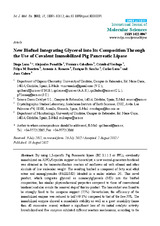New Biofuel Integrating Glycerol into Its Composition Through the Use of Covalent Immobilized Pig Pancreatic Lipase
Autor
Luna, Diego
Posadillo, Alejandro
Caballero, Verónica
Verdugo-Escamilla, Cristóbal
Bautista, Felipa M.
Romero, Antonio A.
Sancho Puebla, Enrique
Luna, Carlos
Calero, Juan
Editor
MDPIFecha
2012Materia
BiofuelsSunflower oil transesterification
Covalent immobilization
Pig pancreatic lipase (PPL)
Sepiolite
Amorphous AlPO4
Monoglyceride
METS:
Mostrar el registro METSPREMIS:
Mostrar el registro PREMISMetadatos
Mostrar el registro completo del ítemResumen
By using 1,3-specific Pig Pancreatic lipase (EC 3.1.1.3 or PPL), covalently
immobilized on AlPO4/Sepiolite support as biocatalyst, a new second-generation biodiesel
was obtained in the transesterification reaction of sunflower oil with ethanol and other
alcohols of low molecular weight. The resulting biofuel is composed of fatty acid ethyl
esters and monoglycerides (FAEE/MG) blended in a molar relation 2/1. This novel
product, which integrates glycerol as monoacylglycerols (MG) into the biofuel
composition, has similar physicochemical properties compared to those of conventional
biodiesel and also avoids the removal step of this by-product. The biocatalyst was found to
be strongly fixed to the inorganic support (75%). Nevertheless, the efficiency of the
immobilized enzyme was reduced to half (49.1%) compared to that of the free PPL. The
immobilized enzyme showed a remarkable stability as well as a great reusability (more
than 40 successive reuses) without a significant loss of its initial catalytic activity.
Immobilized and free enzymes exhibited different reaction mechanisms, according to the different results in the Arrhenius parameters (Ln A and Ea). However, the use of supported
PPL was found to be very suitable for the repetitive production of biofuel due to its facile
recyclability from the reaction mixture.

